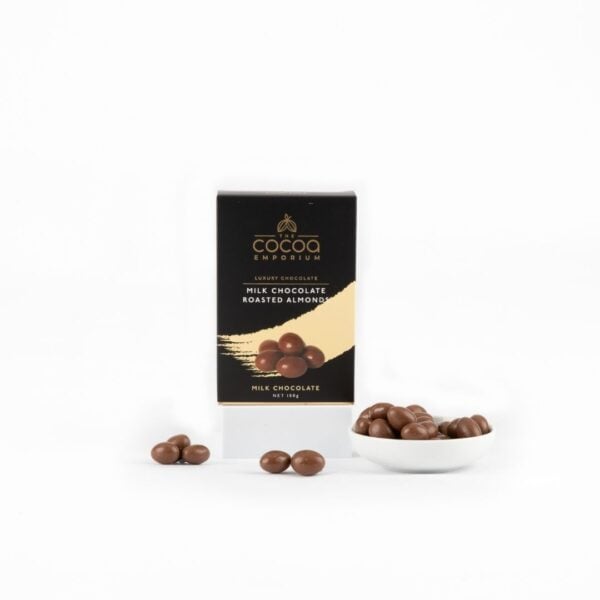What Are the Health Benefits of Dark Chocolate?

What Are the Health Benefits of Dark Chocolate?
Dark chocolate, often touted as a decadent indulgence, is much more than just a treat. Unlike its sweeter counterparts, dark chocolate is rich in nutrients and compounds that offer a wide array of health benefits. This beloved confection has been consumed for centuries and has a long history of being used for medicinal purposes. Recent scientific studies have confirmed that the nutrients found in dark chocolate contribute to a number of positive effects on both physical and mental well-being.
In this post, we’ll explore the numerous health benefits of dark chocolate, including its impact on heart health, brain function, and overall wellness. We’ll also touch on how to incorporate dark chocolate into your diet in a healthy and balanced way. Check out our range of delectable gift baskets with all types of dark to white chocolate so everyone has something to enjoy!
Nutritional Profile of Dark Chocolate
Before diving into the specific benefits, it’s essential to understand the nutritional makeup of dark chocolate. The key factor that distinguishes dark chocolate from milk or white chocolate is its higher cocoa content. Cocoa is packed with bioactive compounds such as flavonoids, which are powerful antioxidants. Dark chocolate also contains a notable amount of fibre, healthy fats, vitamins, and minerals. A typical 100g bar of dark chocolate with 70-85% cocoa content contains:
- Iron: 67% of the recommended daily intake (RDI)
- Magnesium: 58% of the RDI
- Copper: 89% of the RDI
- Manganese: 98% of the RDI
- Potassium, phosphorus, zinc, and selenium: Small but beneficial amounts
While dark chocolate is relatively high in calories and fat, the fats present are mostly healthy fats, including oleic acid, stearic acid, and palmitic acid. The antioxidants in dark chocolate, particularly flavonoids, are believed to be responsible for many of its health benefits.

Dark chocolate is loaded with potent antioxidants, which help protect the body from oxidative stress caused by free radicals. These free radicals can damage cells and are linked to ageing, inflammation, and chronic diseases. Flavonoids, one of the key antioxidants in dark chocolate, are known for their ability to improve blood flow, reduce inflammation, and lower blood pressure.
Cocoa has even been found to have a higher concentration of antioxidants than many other “superfoods,” such as blueberries and acai berries. The high antioxidant content means that dark chocolate can help neutralise harmful free radicals in the body, potentially reducing the risk of certain diseases.
2. Supports Heart Health
One of the most well-researched benefits of dark chocolate is its positive effect on heart health. Several studies have shown that consuming dark chocolate can improve various markers of heart health, including blood pressure, cholesterol levels, and endothelial function (the lining of blood vessels).
- Reduces Blood Pressure: The flavonoids in dark chocolate stimulate the production of nitric oxide, a compound that helps relax blood vessels and improve blood flow. This, in turn, can lead to lower blood pressure, particularly in individuals with slightly elevated levels. Multiple studies have found that consuming moderate amounts of dark chocolate can lead to a small but significant reduction in blood pressure.
- Lowers “Bad” Cholesterol: Dark chocolate has been shown to reduce levels of LDL cholesterol (the “bad” cholesterol) in the blood while raising HDL cholesterol (the “good” cholesterol). LDL cholesterol can build up in the arteries, leading to atherosclerosis, a condition that increases the risk of heart attack and stroke. By improving cholesterol levels, dark chocolate helps protect against heart disease.
- Reduces Inflammation and Improves Circulation: The flavonoids in dark chocolate also have anti-inflammatory properties that can help reduce chronic inflammation in the body. Inflammation is a key factor in many chronic diseases, including heart disease. By lowering inflammation and improving blood flow, dark chocolate supports overall cardiovascular health.
- Boosts Brain Function
Dark chocolate isn’t just good for your heart; it’s good for your brain too. The flavonoids in cocoa can improve cognitive function, particularly in areas of the brain responsible for memory and learning. Some studies suggest that regular consumption of dark chocolate may even reduce the risk of developing neurodegenerative diseases such as Alzheimer’s and Parkinson’s.
- Increases Blood Flow to the Brain: Just as flavonoids improve circulation in the cardiovascular system, they also enhance blood flow to the brain. Improved blood flow increases the delivery of oxygen and nutrients to the brain, which helps support cognitive function, particularly during mentally demanding tasks.
- Enhances Cognitive Function and Memory: Several studies have shown that the consumption of cocoa flavonoids can improve memory, attention, and problem-solving skills. A study conducted on young adults found that those who consumed high-flavonoid dark chocolate performed better on cognitive tasks than those who did not. Dark chocolate also appears to enhance verbal fluency and working memory in older adults, contributing to better brain health as we age.
- Reduces Stress and Improves Mood: Dark chocolate can also have a positive effect on mood, thanks to its ability to stimulate the production of serotonin and endorphins – the brain’s “feel-good” chemicals. These compounds help reduce feelings of stress, anxiety, and depression. Moreover, dark chocolate contains small amounts of caffeine and theobromine, which can give you a mild energy boost without the jitters often associated with high-caffeine products like coffee.
- Helps Control Blood Sugar
Though dark chocolate contains sugar, its low glycaemic index means it does not cause significant spikes in blood sugar levels. The flavonoids in dark chocolate can also improve insulin sensitivity, which is beneficial for individuals with diabetes or those at risk of developing the condition.
- Improves Insulin Sensitivity: Several studies have found that dark chocolate can improve the body’s sensitivity to insulin, the hormone responsible for regulating blood sugar levels. Improved insulin sensitivity reduces the risk of type 2 diabetes and helps maintain stable blood sugar levels in those who already have the condition.
- Reduces Risk of Type 2 Diabetes: By improving insulin sensitivity and lowering blood sugar spikes, dark chocolate may help lower the risk of developing type 2 diabetes. However, it’s essential to consume dark chocolate in moderation, as excessive sugar intake can negate these benefits.
- Promotes Skin Health
Surprisingly, dark chocolate can also benefit your skin. The flavonoids in dark chocolate protect the skin from sun damage, improve hydration, and increase blood flow to the skin, giving it a healthy glow.
- Protects Against Sun Damage: The antioxidants in dark chocolate can help protect your skin from the harmful effects of UV radiation. A study found that individuals who consumed high-flavonoid cocoa had increased resistance to UV rays, reducing the risk of sunburn and long-term skin damage.
- Improves Skin Hydration and Texture: Dark chocolate has been shown to improve skin hydration, reduce roughness, and enhance the overall texture of the skin. This is likely due to its ability to improve circulation and increase blood flow to the skin’s surface.
- Aids in Weight Management: Though dark chocolate is calorie-dense, when consumed in moderation, it may help with weight management. The rich, intense flavour of dark chocolate can satisfy cravings, helping to reduce overall calorie intake.
- Reduces Cravings: Dark chocolate is incredibly satisfying due to its rich flavour and texture. Because of this, a small piece can often curb cravings for sweet, salty, or fatty foods, helping you avoid overindulging in unhealthy snacks.
- Promotes Satiety: Dark chocolate has been found to increase feelings of fullness and reduce appetite. This effect is particularly beneficial for those trying to lose or maintain weight, as it can help control portion sizes and prevent overeating.
Though dark chocolate is calorie-dense, when consumed in dark chocolate can satisfy cravings, helping to reduce overall calorie intake.
- Reduces Cravings: Dark chocolate is incredibly satisfying due to its rich flavour and texture. Because of this, a small piece can often curb cravings for sweet, salty, or fatty foods, helping you avoid overindulging in unhealthy snacks.
- Promotes Satiety: Dark chocolate has been found to increase feelings of fullness and reduce appetite. This effect is particularly beneficial for those trying to lose or maintain weight, as it can help control portion sizes and prevent overeating.
7. Contains Essential Minerals
Dark chocolate is a good source of essential minerals such as iron, magnesium, copper, and manganese, all of which play vital roles in maintaining overall health.
- Iron: Iron is crucial for the production of haemoglobin, which carries oxygen in the blood. Dark chocolate provides a significant portion of your daily iron needs, which is particularly beneficial for individuals prone to iron deficiency.
- Magnesium: Magnesium is essential for over 300 biochemical reactions in the body, including muscle function, nerve signalling, and maintaining a healthy immune system. Dark chocolate is an excellent source of magnesium, helping support these vital functions.
- Copper and Manganese: Both copper and manganese are important for brain function, bone health, and the production of enzymes that help with energy production and antioxidant defence.
How to Incorporate Dark Chocolate into Your Diet
While dark chocolate offers numerous health benefits, it’s essential to consume it in moderation due to its high calorie and fat content. Choosing dark chocolate with at least 70% cocoa content will provide the highest concentration of flavonoids and other beneficial compounds. A small portion, such as 20-30 grams, can be enjoyed daily as part of a balanced diet. See our range of gift baskets with dark chocolate, and a range of other chocolates to indulge in.
Conclusion
Dark chocolate is a delicious and nutrient-rich food that offers a range of health benefits, from improving heart health to boosting brain function and promoting skin health. The key is to choose dark chocolate with a high cocoa content and enjoy it in moderation. By doing so, you can indulge in its rich flavour while reaping the benefits for both your body and mind. So, the next time you reach for a sweet treat, consider dark chocolate – your heart, brain, and taste buds will thank you!







